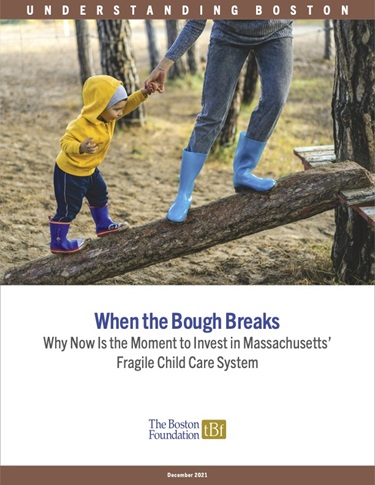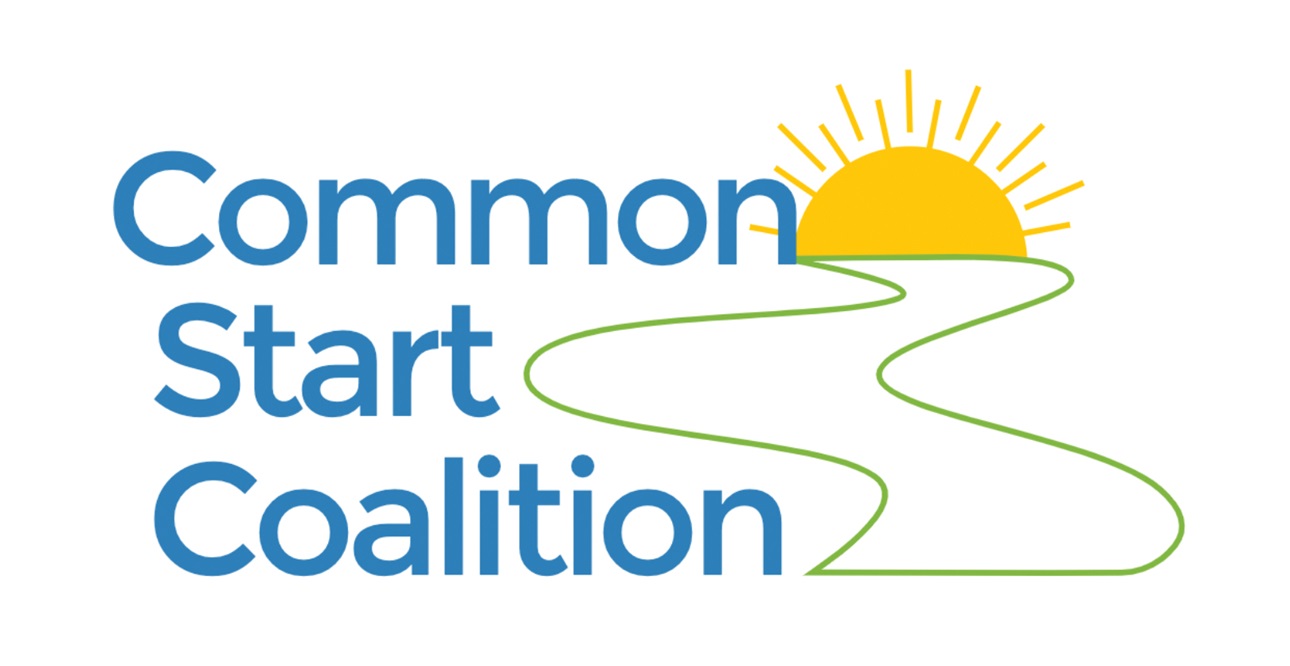When the Bough Breaks: The Crisis in Child Care
TBF News Winter 2022
It is impossible to overstate the seriousness of the crisis in child care in Massachusetts. Many assume it was caused by the challenges of COVID, but in truth, the pandemic only pulled back the curtain on a financially fragile and fragmented system that struggles desperately to provide an absolutely essential service to working families.
“Too many parents in the Commonwealth have long known that quality and affordable child care is out of reach,” says Elizabeth Pauley, the Boston Foundation’s Associate Vice President of Education to Career. She explains that Massachusetts has one of the most expensive child-care markets in the United States. According to the Center for American Progress, infant care in Massachusetts can cost $2,000 a month, more than many mortgages, and roughly equivalent to three-quarters of the annual cost of tuition, room and board at the University of Massachusetts. “In a state that prides itself on its commitment to education,” adds Pauley, “the financial investment has been largely focused on the K-12 system, and not on child care, where the return on investment is well-documented and extremely powerful.”
The result? In a time of vast income inequality only exacerbated by the pandemic, there are fewer options for quality care available to low-income families, forcing parents to make difficult choices.
Worse still, child-care providers, most of whom are women of color and operate as small businesses, work within razor-thin margins, earning little by way of income, and struggling at times even to maintain operations. Child-care workers are among the lowest paid of any major sector serving children.
In December, the Boston Foundation released a new paper, When the Bough Breaks: Why Now Is the Moment to Invest in Massachusetts’ Fragile Child Care System, which documented the dimensions of the child-care crisis, reporting that the number of available “seats” for young children has fallen by as much as 20 percent in Massachusetts since the pandemic began and it is not at all clear if those seats will return, further limiting the access to child care for young families.
The report brings together data and interviews from families, businesses, advocates and child-care center operators to highlight the strains on the system that were evident before the pandemic, but have been exacerbated in the past two years.
In conversations with providers, parents and advocates, the report’s author, Sarah Jackson, detailed the myriad impacts of a dysfunctional system—from child-care center operators straining to keep going without enough staff to parents whose child care costs more than their take-home pay from work. Advocates Jackson interviewed highlighted the impact on education and the economy. Women are leaving the workforce and children are missing out on critical early screenings for interventions—such as speech or occupational therapy that can prevent developmental delays and reduce special education needs.
“The report highlights the stressors on an early childhood system that often provides high quality, but at an unaffordable price for parents, and with pay levels for child-care workers that are simply not a living wage,” says Pauley. “Over the last five years, one in five childcare providers have closed their doors, and those that remain are under constant strain.”
The impact of the crisis falls disproportionately on parents of color, who are more likely to be low-wage workers, have been affected more heavily by job or housing loss during the pandemic, and rely on family-based child-care providers.
“The directors I talk to are panicked,” says Amy O’Leary, a major advocate for child care and early education, who runs Strategies for Children, a statewide early childhood advocacy group. “They are in their classroom from morning until night because they can’t find enough staff.”
Advocates also highlight the potential impact of state and federal policies on the system. At the federal level, the Build Back Better Act, which is stalled in the throes of partisan infighting, would provide billions of dollars to cap child-care costs for most families at seven percent of income, and raise wages for child-care workers—as well as create free universal pre-school for all three- and four-year-olds.
Legislation that has a better chance of passing is on the docket in Massachusetts. Known as Common Start, the bill would provide a framework for sharply expanding early education and child care over five years, starting by benefiting families with the lowest income and capping child-care costs at seven percent of family income for most residents. It would also drive higher wages for child-care workers and provide more stable, sustainable funding for centers.
Advocates caution that if we fail to take the opportunity now, when pandemic funds are available to implement critical changes, there may not be another opportunity. The When the Bough Breaks report closes on a quote from longtime education leader Turahn Dorsey. “This is something the community can do together,” he says. “If we don’t do what we know works, then shame on all of us.”
A TBF Donor on the Early Childhood Crisis
A number of individuals, families and companies with Donor Advised Funds at the Boston Foundation are deeply invested in tackling the crisis in child care and early education. Since the fall of 2018, many have attended a series of early morning convenings called Early Childhood Coffee and Conversation, which recently focused on the When the Bough Breaks report. TBF donors Mark and Etta Rosen have both been deeply involved in addressing this critical issue.
The topic actually has been central to donor Etta Rosen’s work and advocacy for more than half a century. “If we are to have hopes of closing the achievement gap and addressing inequities in our society, paying attention to how the youngest children are cared for is critical,” she says. “The damage from missed opportunities before school starts can create permanent obstacles to future success. There are so many societal needs that require attention, but a long-term view allows that some of those can be mitigated by focusing on young children. We can’t afford to continue to ignore or sideline the needs of our children.”
Visit the City of Ideas blog to explore our conversation with Etta Rosen.



